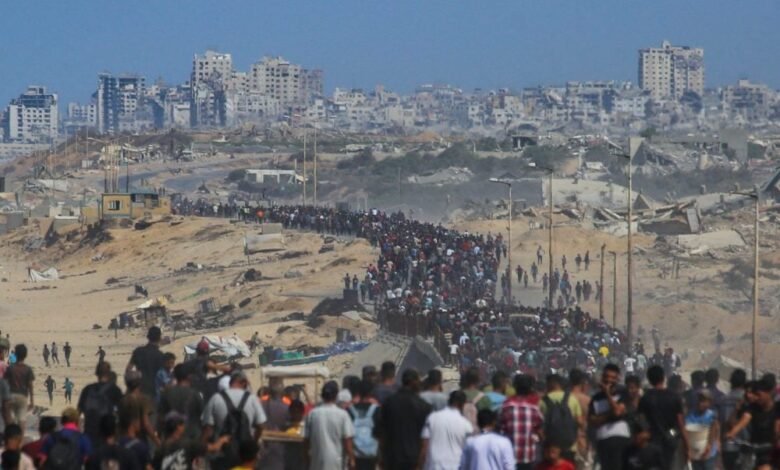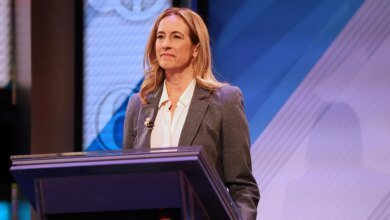Diana Buttu on the Road Ahead for Palestine

One week into the start of a cease-fire between Hamas and Israel, important elements of the first phase of U.S. President Donald Trump’s plan remain unfinished. Hamas has not been able to return the remains of all of the deceased Israeli hostages; aid into Gaza has increased from before, but the United Nations says its teams were unable to get inside on Monday and Tuesday; and it is still unclear whether Hamas will disarm or forswear involvement in the future of Gaza, two elements crucial for the deal to proceed to its second phase.
What happens next for Palestinians? How will they organize themselves in the coming months, and who will govern them? On the latest episode of FP Live, I spoke with Diana Buttu, a former spokesperson for the Palestine Liberation Organization (PLO), and a lawyer who has lived in both Gaza and Israel. What follows here is a condensed and lightly edited transcript. Subscribers can watch the full discussion in the video box atop this page or follow the FP Live podcast.
Ravi Agrawal: I know you have many friends in Gaza. How are they feeling this week?
Diana Buttu: I have many, many friends in Gaza. Every one of them has had their home destroyed. Every one has had family members killed. Every one of them has lost a significant amount of weight. They’ve returned back to rubble. They’re still starving. There’s no fresh water. Nothing has changed for Gazans except that the bombs have stopped. And so I’m still very, very, very worried about them, especially since the entire health system has been destroyed. All aspects of life have been destroyed and the world is applauding this agreement, when they’ve ignored two years of genocide.
RA: You’ve sat at the negotiating table yourself. One week on, what do you make of the agreement?
DB: It’s important to step back. Over the past two years, every major human rights organization has said that this is genocide. The Association of Genocide Scholars labeled it genocide. The International Court of Justice, over a year and a half ago, said that there’s a plausible case for genocide. Even two Israeli human rights organizations have said that it is genocide.
This means all countries around the world should have come together and stopped genocide. Genocide is not something to make a determination about after the fact. It’s something to be stopping; otherwise there’s no point to having a genocide convention. But instead of the world coming together and putting an arms embargo on Israel, or putting sanctions on Israel, or halting trade with Israel, they forced Palestinians to negotiate an end to their genocide. And that’s so repugnant.
Palestinians were also forced to negotiate an end to famine with the very country that made it clear that it wanted to starve them. [Israeli Prime Minister Benjamin] Netanyahu is wanted for war crimes for starvation.
People in Gaza are happy that the bombs have stopped (though they haven’t completely stopped, by the way). But at the same time, they and I feel that this whole issue of genocide has just been papered over, that there’s no accountability, and that the world community has failed. For example, the flotilla with more than 40 ships and 500-plus activists were trying to do work that the international community should have done. These activists were abducted in international waters. They were brought to Israel against their will. They were imprisoned. They were beaten up and then deported. Countries around the world, including the activists’ own countries, did nothing and said nothing. So people in Gaza are feeling very abandoned right now.
RA: Israelis will often say that the hostages, and how long Hamas held them, make this different from other conflicts or even other genocides. When it comes to this deal, I don’t quite understand why Hamas finally agreed. You’ve often called this an Israeli deal that was presented and brokered by the Americans. So why did Hamas give up the hostages, who were their final piece of leverage? Why now?
DB: In terms of the hostages, Israel is holding 11,000 hostages in Israeli prisons. So if it was OK for Israel to decimate Gaza, kill 67,000 people, destroy 90 percent of the homes, destroy the entire health care system for 248 Israelis, what are Palestinians allowed to do? This is not my logic; this is their logic. I’m trying to get you to see the idea that Palestinians are so dehumanized that Israelis are allowed to do all that for 248, but Palestinians are supposed to stay silent when 11,000 Palestinians are held hostage.
So, why did they agree now? From the very beginning, Hamas said that they were willing to hand over all of the Israelis if there was a halt to the bombing. But Netanyahu said no. Then Trump came out with his plan, which really is an Israeli plan with a Trump label on it. Hamas’s response was: “We don’t want anything to do with governance. If we deal beyond that small piece and sign on to all of this, then we’ll be guilty of the exact thing that Fatah did back in the ’90s. So we can hold onto this small little piece of just the Israelis.” With all this other pressure, Israelis said, “Yes, you’re going to have to release the Israelis and we will release Palestinians,” but then all of the rest of this comes into play.
RA: That doesn’t quite answer the question of why now? On the Israeli side, there is a case to be made that they overstepped with the Sept. 9 attacks on Qatar, which, of course, led to a lot of pressure from President Trump and other Middle Eastern countries. That changed the calculus for them. But again, why would Hamas think differently today than it did six months ago, one year ago?
DB: I think it was the same six months ago and a year ago. Remember, it was Israel who unilaterally violated the January cease-fire agreement back in March. Why now? There was a lot of pressure on them.
RA: There are so many things that have yet to be accomplished in the so-called phase one of this deal. Israel said Hamas has to disarm, and it hasn’t. Israel said Hamas has to forswear future involvement in Gaza, and it hasn’t. Israel’s also saying that phase two can’t begin until phase one has been deemed complete. Do you think we’re ever going to get to a phase two?
DB: It’s interesting that you ask that, because Trump already declared that phase two has begun. He also said, we understand that Hamas needs to be in control of the streets, and we’ve given them some time to be in control of the streets. So there are some mixed signals there.
But you have to also think logically. There isn’t anybody else in Gaza right now, and somebody needs to be there. Why does Israel get to determine who’s running the streets of Gaza when they’re the ones who have carried out genocide over the course of the past two years? Israel should have zero say in Palestinian life and in Palestinian futures.
If you look back in history, Israel hasn’t abided by agreements or U.N. resolutions. So this is the time when you need outside involvement and mediators. A lot of people are placing their faith in the mediators, but I’m not so sure they’ll be there on a day-to-day basis making sure that everything is going in the way that it should be. Israel announced that it’s not going to allow mobile homes to go into Gaza, but this is the time where there needs to be a surge of aid, so the mediators need to be there right now.
RA: Trump’s plan has called for an apolitical technocratic committee overseen by a “Board of Peace.” What do you make of that?
DB: That board, which would be the future governance, is problematic. It feels like we’re going back in time. I personally thought that the era of colonialism had ended. And it has around the world, except in Palestine, where it’s gone backward. Isn’t it time for Palestinians to choose their own leaders, rather than this Board of Peace choosing somebody for us? But here’s somebody like Tony Blair, who doesn’t exactly have a great track record in the Middle East—
RA: This is the former British prime minister, former head of the so-called Quartet on the Middle East.
DB: When he was in the Quartet, he didn’t do a great job. The Quartet represented the United States, the United Nations, Russia, and the European Union, and they’re supposed to be pushing. But as the Quartet representative, Blair was unable to push. What gives us confidence that he’s going to be able to push for the reconstruction of Gaza, where there’s much more at stake?
RA: Let’s talk more about your colonization. There was a wave of decolonization across what we now call the global south in the 1940s, and that is the exact moment when Israel came into being. That was the moment of the Nakba, of course. You said that history is going in reverse now. What would it take for it to re-reverse itself?
DB: It takes a political decision. And the political decisions have so far been the exact opposite. Let’s talk about the Nakba. The Nakba is the ethnic cleansing of Palestine. It’s the prelude to what we saw over the course of the past two years. The world allowed that to happen in 1948. Palestinians were told that we just had to accept it and just move on and move on. It’s still unclear to me why we’re supposed to just move on and accept it.
And yet fast-forward 19 years to 1967. Israel occupies the West Bank and the Gaza Strip. Instead of ending its military occupations, Israel has now entrenched it. In 1988, the PLO accepted a two-state solution, with Israeli presence on 78 percent of our historic homeland in exchange for getting to live in the West Bank and Gaza Strip, which is 22 percent of historic Palestine. And instead of the world pushing Israel to do that, they allow all these settlements to go up.
Rather than stopping colonialism, it becomes fresh and new and the world lets it thrive. Palestinians are always told, “You need to negotiate an end to colonialism. You need to negotiate with your occupier.” This is the period that I was involved in, when everything was up for negotiation.
Here we are in the year 2025. Palestinians are still told: “Your leadership has to look a certain way. They have to speak a certain way. You have to think a certain way.” It just doesn’t make any sense that Palestinians are always being told how we should think, how we shouldn’t act, what we should do, and none of these conditions are ever put on Israelis.
RA: I will point out that there have been mass protests in Israel over the last three-plus years over Prime Minister Netanyahu’s governance, but your point is taken.
You wrote an essay a few weeks ago in which you used the term “magic pill” to refer to all the years that you negotiated for a two-state solution—a magic pill that is deployed completely in vain. Can you explain that a little bit?
DB: I joined the Palestinian negotiating team in 2005. Before I arrived, from the time that [the] Oslo [Accords] was signed back in 1993, up through the Camp David negotiations in 2000, we kept hearing—“we” being the Palestinians—every government, every head of state say, “We support the two-state solution.” They would extend it and say, “We support a two-state solution achieved through negotiations.” I heard this phrase so often that I actually thought that they meant it. Yet the situation on the ground was getting worse and worse and worse.
I write in the piece about a couple of vignettes. One is about how the Israelis started to build a bunch of outposts that were illegal, even by Israeli standards. They would take over privately held Palestinian land with guns, and armed squatters would stay there day after day. Diplomats would drive by and see it. I would say, “You’ve got to do something about this. You have a trade agreement with Israel that says that you shouldn’t be doing business with the settlements.” They would politely nod their head and they would say, “Oh, but this will all be undone with a two-state solution.” It was as though the two-state solution became this magic pill they had swallowed. I’d take them to visit Palestinians who had been literally abducted and held in prison for months on end without charge, sometimes beaten or tortured. They would nod and say, “Oh, but all of this will be undone with the two-state solution.” It became a way for them to placate themselves and to placate us by saying, “All this will just go away magically through this two-state solution.” Over time it became theater to me, watching this over and over again, year after year.
From the time that Oslo was signed to the time when I showed up, the settler population doubled from 200,000 to 400,000. Today it’s roughly 800,000. I just don’t see how those settlers are going to leave unless there are sanctions put on Israel. Those sanctions could have been put on Israel ages and ages ago—but they just didn’t want to do it. The international community just ignored the harm that Israel caused. It’s so dehumanizing.
It was most striking when I lived in Gaza. We were working on the disengagement, when Israel pulled out its settlers from Gaza and redeployed its soldiers. Israel just clamped down on Gaza. We kept saying, “If you want Gaza to thrive, you need to open it up. Let it have an airport, a seaport, a connection to the West Bank.” We were told time and again, “Just negotiate with Israel, negotiate with Israel, negotiate with Israel.” Instead, Israel turned the Gaza Strip into a huge prison. We knew they would, and still the world did nothing. We ended up seeing the result 17 years later.
RA: The vast majority of the world had already recognized the state of Palestine. But how do you look at the spate of mostly European countries that are now doing so?
DB: Hypocritical. First, they instead should have been doing this a long time ago. But second, and more importantly, they’re doing this during the period of genocide, instead of enacting measures to hold Israel to account. They’re throwing a cookie at us. I’m still trying to wrap my head around what it is that they have recognized because so many of these countries showed up to the Sharm El-Sheikh summit, and in the Trump plan, the Israelis are remaining there. Are they recognizing Palestine as the West Bank and Gaza Strip? Are they recognizing it with the Israeli forces there? Are they recognizing the state of Palestine with the Blair team there? It is entirely unclear to me, and to them, what it is that they are recognizing. This has become the new magic pill for them.
RA: Given everything you’re saying about these magic pills, do you even believe in a two-state solution anymore?
DB: It died ages and ages ago. I think that it died the minute that there was no political will among the international community to pull out the settlers, back in 1967.
RA: What is the desired end state for Palestinians? Given what you say about the two-state solution, are you thinking about a single federated state or one single secular country?
DB: It’s not for me to decide. But we have to begin by looking at the question of accountability. I live in Haifa most of the time. When you live there, you see that your neighbors think that what they did in Gaza is OK. You see women working out to a song that says, “May your village burn.” You’re seeing racism so rampant that it’s from the leadership on down. When they think that it’s OK to drop bombs on hospitals, to kill—we have to get to a place where there is a measure of accountability. There was never any accountability in 1948, which led to a horrendous occupation for now 58 years. Because there was no accountability any step of the way, this has led to genocide now. For me, it all begins with accountability, and then we can start talking.
Are there groups that are talking about a one-state solution? Yes, and it’s increasing. I have to say, there’s a lot more talk of it now than there was before October 2023. People are recognizing that the system of supremacy is not working. Interestingly, the people who are joining this more are Jewish Israelis. Again, it’s not for me to decide. This is a collective decision, and it begins with accountability.
RA: I’m hearing two things from you when it comes to accountability. There’s personal accountability—where you reflect and figure out what went wrong to get to this place—and there’s international law, and ensuring that there is impunity for certain types of actions. Let me flip the question now: What kind of accountability should Palestinians think about both in terms of personal reflection and international law?
DB: It’s already happening. In the aftermath of any of these horrendous massacres, people will always ask these questions. The problem then, Ravi, is that as much as we have this conversation, it then gets taken over by the reality of a very brutal military occupation. I don’t know what more to say other than that.
This is personal, but it’s just the only thing that I can talk about. I don’t think that the Palestinian leadership has ever really been held to account for Oslo. I was part of that era. I didn’t sign it. It wasn’t my fault. But I was part of it. And I don’t think that the policy leadership has ever been held accountable for the way that they’ve behaved over the course of the past two decades, and they should be.
RA: What would that look like?
DB: I’m not really sure. I think part of it is admitting a mistake, right? Oslo was a huge mistake—it really was. And even if somebody just came forward and said, “look, this was a mistake, but this is what we’re stuck with,” or, “this was a mistake, but here are alternatives,” that would be better than the years of staying silent, which this leadership has done. Actually, they haven’t—they’ve doubled down and said that Oslo was the best thing ever, which it really hasn’t been.
RA: Given everything you’re describing about the settlements, about the lack of impunity, about international law and rules and norms, are we in a world now where the only thing that matters is hard power?
DB: I don’t think so. Maybe this is the optimist in me, but the reason I’m saying this is because over the course of the past two years we saw a groundswell of support—not just the global south, but everywhere—for Palestine. This included, as I already mentioned, people who were willing to put their lives on the line to join rounds of flotillas, march around the world, and join the student protest movement even throughout the crackdowns. These were not cases where, as in the war in Iraq, people’s own soldiers were implicated. This was to stop genocide. This was far away. So I think that these measures of soft power had an impact.
Does hard power play a role? Absolutely. And that’s why we’ve seen Israel get away with so much, whether it’s the use of the veto at the U.N. Security Council or all of the weapons that went to Israel over the course of the past two years. These things matter, but I do think that soft power can influence hard power. The other thing that has been important for me to watch is the ways in which legal systems have been used—everything from the International Court of Justice to domestic legal systems. I’m not so naive as to think that everything is going to work through this, but I do think that it is making a change.
RA: The other players over the last few weeks, and indeed the last two years, are many other Arab states, like Qatar and Egypt. Do you think that they will come good if there is a phase two? Will they stump up the money? Will they help Gaza rebuild and organize? Will they stand up for international law? Do you have faith in the neighbors, as it were?
DB: I do have faith that they will come and try to rebuild, although it should be Israel that’s paying the reparations, not them. But I do think that they’ll come forward and pay and try to get aid in. They already are. The parts that I am worried about are pushing Israel and the U.S. to make sure that this isn’t just papered over and ignored. I’m less worried about Qatar, because it has played quite an instrumental role throughout, both in its role as a mediator and otherwise. But some of the other states have not stepped up, and so far for them, it’s been a question of just trying to do away with it to try to get rid of some of the domestic tension that exists.
But again, I’m worried more about the longer-term things. Do they have the stamina? Do they have the bandwidth? Are they going to continue to push? Are they going to want to confront Israel? Because that’s what it requires. And if Europe’s not going to confront Israel, I don’t see Egypt confronting Israel.
Don’t miss more hot News like this! Click here to discover the latest in Politics news!
2025-10-17 21:17:00




